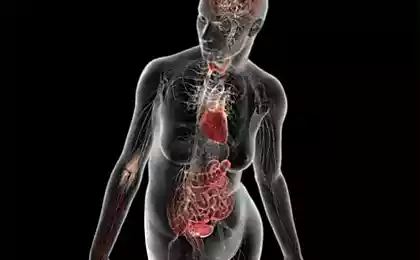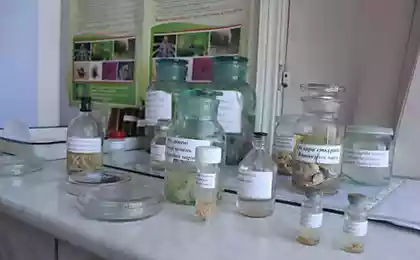451
Helminth control childbirth
The presence of large numbers of children of Bolivian women have been associated with the infection by some parasites.
Anthropologists at the University of California, Santa Barbara (University of California at Santa Barbara — UCSB), during the nine years examined women tribe tsimane in Bolivia, came to the conclusion that the presence of parasites in the body can affect women's reproductive ability.
On average, each woman tribe tsimane for your life giving birth to nine children. However, as it turned out, different species of parasitic worms are able to shorten and lengthen the periods between births. Researchers under the leadership of Aaron Blackwell (Aaron Blackwell), associate Professor of anthropology at UCSB, studied infection the two most common species of helminths — nematodes (Necator americanus or Ancylostoma duodenale), and roundworm (Ascaris lumbricoides).
After analyzing the data, the researchers came to the conclusion that ascariasis enhances the probability to become pregnant, and nematodes, on the contrary, reduces reproductive ability. While women infected with hookworm are born on average three fewer children than in the absence of helminthiasis and ascariasis — two more children.
Seventy eight million seven hundred eleven thousand three hundred ninety eight
The researchers read that it is connected to various immune system reaction to two types of parasites. Increasing or decreasing the level of T-cells in the body, worms indirectly affect the ability to conceive. In addition, helminth infections in members of the tribe are associated not only with the development of anemia and other diseases, but also affect the probability of contamination with other parasites. While helminth infection in people tribe tsimane often asymptomatic.
"Our results show that helminth infections can have a significant impact on the birth rate in certain populations, says Aaron Blackwell. — In addition, developed countries should also pay attention to this fact because many reproductive problems associated with autoimmune diseases."
"Research indicates that parasitic diseases and their impact on the immune system may be related to broader aspects of health and well-being, says co-author Michael Gurven (Michael Gurven), Professor of anthropology at UCSB. While we don't know the details of this mechanism but one thing is clear: the presence in the body of "old friends", helminths, can have far-reaching consequences".
In recent years, increasingly hear statements of scientists that infection and infestations have an ambiguous impact on human rights. So, in October 2015 in the journal PLOS published the work of researchers from the London school of hygiene and tropical medicine (The London School of Hygiene & Tropical Medicine).
According to the authors, the immune system formed by the interaction of worms-parasites. After their expulsion protective of human cells mistaken for the enemy elements of the environment, including the proteins of pollen and food. Thus, scientists believe that the development of allergic reactions is responsible for getting rid of parasites. published
P. S. And remember, only by changing their consumption — together we change the world! © Join us at Facebook , Vkontakte, Odnoklassniki
Source: facebook.com/Osteolife/posts/1134038869941024:0
Anthropologists at the University of California, Santa Barbara (University of California at Santa Barbara — UCSB), during the nine years examined women tribe tsimane in Bolivia, came to the conclusion that the presence of parasites in the body can affect women's reproductive ability.
On average, each woman tribe tsimane for your life giving birth to nine children. However, as it turned out, different species of parasitic worms are able to shorten and lengthen the periods between births. Researchers under the leadership of Aaron Blackwell (Aaron Blackwell), associate Professor of anthropology at UCSB, studied infection the two most common species of helminths — nematodes (Necator americanus or Ancylostoma duodenale), and roundworm (Ascaris lumbricoides).
After analyzing the data, the researchers came to the conclusion that ascariasis enhances the probability to become pregnant, and nematodes, on the contrary, reduces reproductive ability. While women infected with hookworm are born on average three fewer children than in the absence of helminthiasis and ascariasis — two more children.
Seventy eight million seven hundred eleven thousand three hundred ninety eight
The researchers read that it is connected to various immune system reaction to two types of parasites. Increasing or decreasing the level of T-cells in the body, worms indirectly affect the ability to conceive. In addition, helminth infections in members of the tribe are associated not only with the development of anemia and other diseases, but also affect the probability of contamination with other parasites. While helminth infection in people tribe tsimane often asymptomatic.
"Our results show that helminth infections can have a significant impact on the birth rate in certain populations, says Aaron Blackwell. — In addition, developed countries should also pay attention to this fact because many reproductive problems associated with autoimmune diseases."
"Research indicates that parasitic diseases and their impact on the immune system may be related to broader aspects of health and well-being, says co-author Michael Gurven (Michael Gurven), Professor of anthropology at UCSB. While we don't know the details of this mechanism but one thing is clear: the presence in the body of "old friends", helminths, can have far-reaching consequences".
In recent years, increasingly hear statements of scientists that infection and infestations have an ambiguous impact on human rights. So, in October 2015 in the journal PLOS published the work of researchers from the London school of hygiene and tropical medicine (The London School of Hygiene & Tropical Medicine).
According to the authors, the immune system formed by the interaction of worms-parasites. After their expulsion protective of human cells mistaken for the enemy elements of the environment, including the proteins of pollen and food. Thus, scientists believe that the development of allergic reactions is responsible for getting rid of parasites. published
P. S. And remember, only by changing their consumption — together we change the world! © Join us at Facebook , Vkontakte, Odnoklassniki
Source: facebook.com/Osteolife/posts/1134038869941024:0























